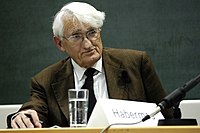
Photo from wikipedia
Indirect speech acts communicate more than their literal meaning, and their comprehension relies on the listener’s ability to draw the appropriate inferences in a given context. We used eye tracking… Click to show full abstract
Indirect speech acts communicate more than their literal meaning, and their comprehension relies on the listener’s ability to draw the appropriate inferences in a given context. We used eye tracking to investigate the cognitive processing involved in the comprehension of simple (direct) and complex (unconventional indirect) communicative acts, a more general distinction that applies not only to sincere speech acts, but also to irony and deceit. We recorded the eye movements of 40 participants while they read 60 stories (20 sincere, 20 deceitful, 20 ironic) consisting of a context and a target answer. For each story, we created two different contexts so that the same identical target answer was a simple (direct) and a complex (unconventional indirect) communicative act, respectively. We also assessed the indirectness of simple and complex communicative acts, as well as participants’ working memory (WM) and theory of mind (ToM). Eye-pattern analysis showed that complex communicative acts were more difficult to understand than simple acts; differences between simple and complex acts held for all the pragmatic phenomena investigated, though processing differences were greater for sincere acts than for irony and deceit. We found a role of indirectness and ToM in the pragmatic processing of simple and complex acts, whereas the role of WM was modest. The present findings underscore the importance of adopting an encompassing theory that can account for different types of indirect speech acts, such as sincere, deceitful and ironic acts; they also suggest the importance of assessing individual differences in inferential and cognitive abilities.
Journal Title: Quarterly Journal of Experimental Psychology
Year Published: 2022
Link to full text (if available)
Share on Social Media: Sign Up to like & get
recommendations!